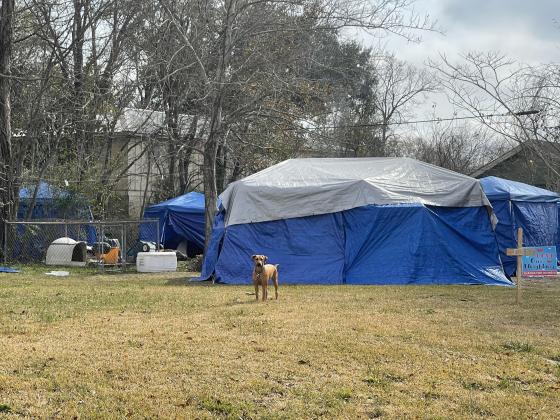From underpasses to private property plots throughout residential neighborhoods, Beaumont’s homeless population is met with mixed reactions wherever the masses set up encampments for multi-transient living. Judging by the mounds of trash frequently discarded at homeless encampments, southern hospitality is never in short supply for the scores of resident homeless. Myriad nonprofit and volunteer groups throughout the region frequent homeless “hot spots” with cooked and packaged food, new and used clothing, hygiene essentials, money and assorted odds and ends.
The goodwill shown to fellow humans living on the street of Beaumont without the benefit of adequate shelter is hard to decry, but residents owning homes and businesses where neighborhood homeless tent cities pop-up into unregulated communes are looking to city officials to show compassion to their plight, as well.
Beaumont City Councilors and Mayor Robin Mouton acknowledge they’ve received complaints from property owners who are now neighbors to pop-tent communes. What city officials can do to limit the existence of these sites, however, is limited, according to the mayor, who advised that state regulations and municipal ordinances govern what actions can be undertaken.
Beaumont home and business owner Barbara Wilson, the purveyor of downtown’s BAW Resale shop, said she has been advised of the city’s limitations time and time again. Wilson hosts a social media site dedicated to helping Beaumont’s homeless population thrive in the city they call home, but has been vocal as to very real problems with the management of such social services to date.
“Everyday it’s new transients because they drop them off here,” Wilson said of the Old Town neighborhood where she lives and works. The Salvation Army shelter move from the feeder road off the interstate to the residential area of McFaddin Street didn’t help the situation.
“They put them out at 7:30 in the morning,” Wilson said, many of the shelter inhabitants having nowhere to go during that day, which leaves an abundance of people mostly sitting on street curbs and wandering nearby parking lots until the Salvation Army pulls up the dinner truck to give to-go plates at 5 p.m. daily. “Maybe they’re supposed to be out looking for work or something,” but many are unable to work due to mental health or assorted issues or stressors, and some are unable to work due to physical limitations. “Then they sit outside until they let them back inside.”
In the hours between 7:30 a.m. and 5 p.m. on any given day, Wilson explained, dozens of homeless persons loiter at nearby businesses and vacant lots, frequently leaving scattered garbage and angry property owners to clean up the litter and call city reps to complain.
“They use to leave a lot of trash across the street, but they’ve been picking it up more recently. At one point, I felt bad for them,” Wilson said of the 20 or so displaced persons who would frequent her business parking lot. “I gave them coffee and let them in, so they wouldn’t have to sit out in the cold. If I let it go, though, it just adds and adds…”
Wilson addresses the influx of transient residents in her neighborhood with an active approach from a compassionate heart; she’s driven a man to Houston to catch a bus; she has employed homeless persons looking for work; she given resources, provided companionship, and genuinely hopes to work toward suitable service offerings for those in need. What Wilson is bothered by, though, is the rotating door of transient persons dropped off in Beaumont neighborhoods without a real plan of action as to how to properly meet their needs.
“Houston, Orange, San Antonio ... they are sent here and they come here not really knowing the area, waiting to get into halfway houses, drug rehabs… whatever,” she said. Of the dozens of homeless persons she’s encountered as of late, Wilson said almost none are from Beaumont.
In speaking with two residents residing at a small tent city on the corner of Sixth Street and Laurel, one was from the neighborhood and the other moved to town for the love of a woman he no longer sees. Six people live in the multiple tents erected on the vacant lot, the pair advised, and the site is equipped with a shower and toilets provided by a church, a shared cooking tent and individual tents for living space.
“I think they’ll look at it like we’re neighborly,” the Beaumont-born resident said of what potential property buyers would think of purchasing a new home next to a tent encampment. “The people who live close by, they don’t mind.”
Further down, both men acknowledged, the sentiment isn’t the same.
When considering where to open new shelter for the city’s homeless population, Wilson wondered if there was consideration in entertaining homeless encampments in the city’s West End. To her knowledge, former City Council rep Virginia Jordan was assured the homeless housing wouldn’t encroach on her property values, but elected officials aren’t the only landowners paying their fair share of taxes in the city.
“Old Town meeting topics months ago included putting persons in the vacant lots,” Wilson recalls. “It was really planned.
“It is what it is. But nobody would want it next door to them.”
Nothing is preventing tent encampments in the city’s West End, however, according to the limitations placed on regulation as presented to the Beaumont business owner.
“We cant park on our own grass,” Wilson said, rattling off several city ordinances that regulate how high grass can be, what vehicles can be parked in driveways, what dimensions a carport can be. Why the city can’t regulate the construction of tent cities escaped her.
“(City officials) say that if the property owner allows it, there’s nothing they can do,” Wilson advised.
But there is something the city can do – after it becomes a public nuisance.
It took many, many months, but the city took action against a pop-up transient living area occupied in a residential neighborhood off Major Drive near Washington during a public hearing on Jan. 25.
Ian Culbertson, the listed owner of 8465 Frazier, did not appear at the hearing, but a representative appearing in the owner’s place could give no assurance that the property would be rehabilitated or that anything could be done to get the owner to comply with the city’s directive to clean up the property.
A visit to the Frazier home features the site amid residential single-family homes with meticulously manicured lawns, artistically decorated mailboxes and updated façades. The Culbertson property stands in stark contrast: Junk piled several feet high can be plainly viewed through unpaneled windows; an overflowing dumpster adorns the front lawn; the backyard is bursting with furniture in various states of decomposition; and trash piles permeate the entire property and flow from broken fencing.
“The property has been declared a public nuisance and is set to be cleaned up,” the Substandard Building Inspection Report produced in support of razing the home reads. “The interior is missing floors. There are transients staying in the backyard so there is trash and junk motor vehicles in the rear.”
Electrical, plumbing and mechanical functions are out of code, the report further details, as well as noting missing exterior doors, a broken garage door, and a roof in need of replacement.
The property is still being financed, but the lienholder had little recourse to stop the razing, and a HUD loan for $8,500 granted in July 2021 for the purpose of property repair is likewise likely lost in the process.
Over conflicting pleas to spare the property from city-controlled cleanup from the property liaison and cries to rid the neighborhood of the eyesore, the elected Beaumont officials declined to let the deterioration of the neighborhood continue.
“We just want to make sure we’re doing the right thing by citizens on both sides,” Mayor Mouton said.
Like the owners of Old Town properties where encampments have been allowed to flourish, the Frazier Street owner does not reside in Beaumont. Many of the “toxic charity” providers are outsider, too.
“They don’t care about it. They don’t live here,” Wilson said in frustration of absent property owners, and caravans of church parishioners who mean well but leave problems for others to deal with when they’re gone.
“They come through with a meal and a sermon – then they’re gone,” she said. “I wish collectively we can come up with some real solutions.
“I don’t know what to do to make it right, but I know it’s getting worse.





